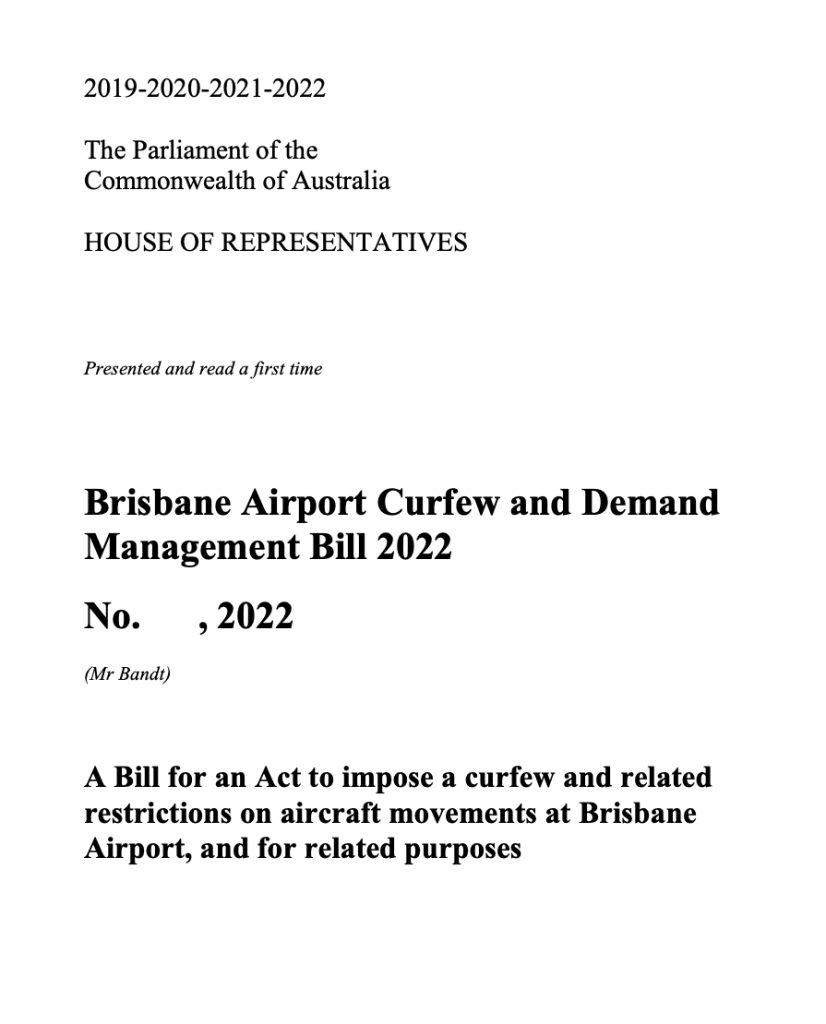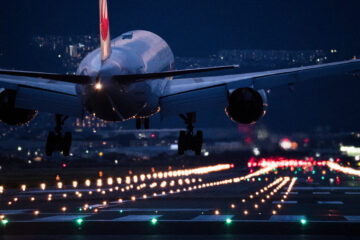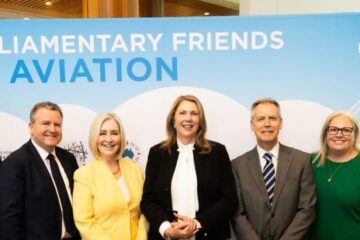Right from the start, BFPCA has been calling for a night curfew to be introduced at Brisbane Airport.
Australia’s busiest airport Sydney has been operating successfully with a curfew, which forms one key component of their multipronged noise abatement strategy helping protect local communities from aircraft noise pollution.
After again offering extensive engagement with us as well as community members, BFPCA is pleased to see Elizabeth Watson-Brown MP, Australian Greens Spokesperson on Infrastructure, Transport and Sustainable Cities, introducing the Brisbane Airport Curfew and Demand Management Bill 2023.
To find out more about the bill, read the associated press release here, and watch speeches by Elizabeth Watson-Brown MP, Max Chandler-Mather MP, and Stephen Bates MP below.
Earlier this week, I asked Parliament to support Brisbane residents who can't get a good night's sleep because of flight noise and all Labor did was make snide comments. I asked for some common sense reforms: caps and curfews for Brisbane Airport and serious investment in our commuter rail infrastructure so Australians have an alternative to aviation to get around the country. Brisbane residents suffer from the worst airport noise in the country. It's so bad that Kevin Rudd called for a night curfew when he was an MP. Brisbane residents have been having disrupted sleep for decades and with flights out of Brisbane Airport set to double over the next ten years, it will only get worse without serious action. Last week we got a serious concession out of the Government. The Minister is directing Airservices Australia to operate both runways at Brisbane Airport on Simultaneous Opposite Direction Parallel Runway Operation mode, meaning more flights over the water and fewer flights over our homes. They know this is a serious problem for tens of thousands of Brisbane residents – and that's why we'll keep fighting until we win caps and curfews. While Labor MPs just want to make jokes about delivering pineapples, the Greens are offering real solutions and delivering real outcomes.
Posted by Stephen Bates – Greens MP for Brisbane on Tuesday, 14 November 2023
In response, Brisbane Airport Corporation is running a public relations scare campaign against the people of Brisbane. Their campaign against noise restrictions is more rooted in its growth ambitions and profit targets than genuine concerns for regional or any communities. Sydney Airport, Australia’s most profitable, has successfully operated with a curfew and cap since the mid 90s, including the 2000 Olympics, proving that such measures can coexist with economic prosperity.
While BAC claims a curfew would cost the Queensland economy $2.8 billion over a decade, it’s vital to provide context. This figure represents just 0.08% of the state’s $360 billion economy – a drop in the ocean.
Moreover, the hidden health and wellbeing costs of excessive noise pollution from constant overhead flights remain unaddressed. For example, in Brussels, a major European aviation hub, a city half Brisbane’s size, a health-economics survey of the annual cost of aircraft noise on residents’ health was completed in early 2023. It found that Brussels Airport causes €1 billion in health damage per year. Brisbane Airport’s real impact on the community must be thoroughly examined, and BFPCA will be releasing its own economic modelling that accounts for health and environmental impacts shortly.
Brisbane Airport Curfew and Demand Management Bill 2022
[The below content is kept for archival purposes as of 14/02/2022 and relates to the Brisbane Airport Curfew and Demand Management Bill 2022.]
After extensive consultation with us as well as community members, BFPCA is pleased to see Adam Bandt MP, the leader of the Australian Greens, introducing the Brisbane Airport Curfew and Demand Management Bill 2022 into the Australian Parliament on 14 Feb 2022. You can watch his speech introducing the bill as well as read the bill following the links below. ABC News have also reported on the bill here.
The Brisbane Airport Curfew and Demand Management Bill 2022 introduces a curfew from 10 pm to 6 am and an hourly movement cap of 45 flights per hour at Brisbane Airport. It also directs the Minister for Transport to instruct Airservices Australia to produce a Long-Term Operating Plan (LTOP) for Brisbane Airport that reduces flight noise, ensures more flights over Moreton Bay and changes flight paths to ensure a fair distribution of air traffic over Brisbane.
A 10 pm to 6 am curfew will ensure every Brisbane resident is able to get a good night’s sleep, without being exposed to unhealthy levels of flight noise.
Meanwhile, a flight cap of 45 flights per hour would allow Brisbane Airport to return to pre-pandemic flight traffic, while ensuring they don’t grow unsustainably beyond that level.
Without a substantial change to flight paths and airport operations, a cap and curfew won’t address many of the fundamental issues with Brisbane Airport.
This is why the bill will also force the Transport Minister to implement a Long-Term Operating Plan for Brisbane Airport, which will ensure that better consideration will be given to:
- more flights will take off and arrive over Moreton Bay;
- a fair distribution of flight traffic over Brisbane that ensures no group of residents is forced to bear the overwhelming majority of flights; and
- an overall reduction in flight noise for all Brisbane residents by prioritising flight routes that don’t pass over residential areas.

BFPCA agrees that these are reasonable and moderate measures that airports around the world have already adopted. Indeed, it’s happening around Australia as well. Sydney Airport already has a Long-Term Operating Plan, a curfew and a cap on flights.
Our key question is: if it’s good enough for Sydney Airport, why isn’t it good enough for Brisbane?
What is an Airport Curfew?
An airport curfew is a legislated restriction on aircraft operations at a federally-leased airport during a specified time period.
Adelaide, Essendon, Gold Coast and Sydney airports have curfews between 11pm and 6am. While most aircraft operations are prohibited during this period, emergency aircraft, some small jets, propeller-driven aircraft and freight movements are allowed. The curfews limit what aircraft can land and take-off and, in some cases, the runways that can be used.
The curfews are legally enforceable and regulated by the Department of Infrastructure, Transport, Regional Development and Communications, who can make a determination of a curfew violation and prosecute an airline or aircraft operator for breaching a curfew.
Airport Curfews, Airservices Australia


